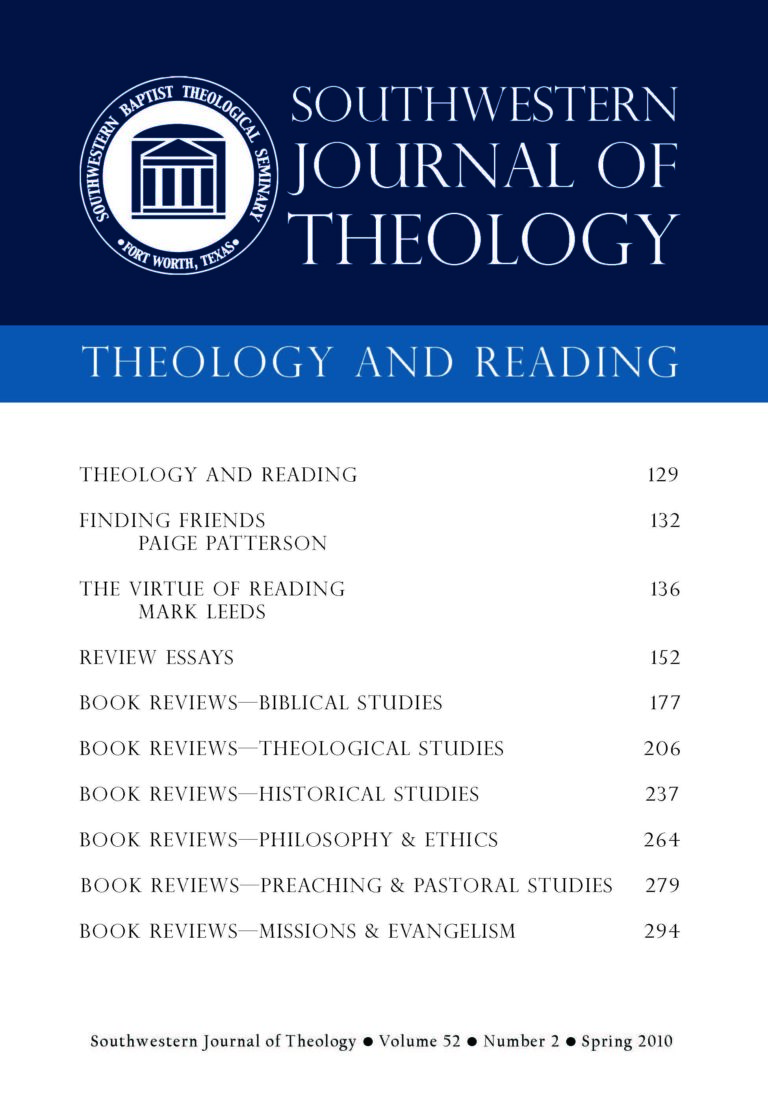
Theology and Reading
Southwestern Journal of Theology
Volume 52, No. 2 – Spring 2010
Managing Editor: Malcolm B. Yarnell III
By Thomas C. Oden. Classic Christian Readers. Grand Rapids: Eerdmans, 2007. 360 pages. Softcover, $25.00.
We must shamefully admit that our evangelical churches are woefully ignorant regarding the pre-Reformation church. Thomas Oden, Professor Emeritus of Theology at Drew University seeks to educate such churches through his Classic Christian Reader series, and evangelicals should be thankful for accessible works in this regard. The Good Works Reader builds on Oden’s Justification Reader by providing insights into the earliest Christian teachings concerning works, outreach and posture toward one’s neighbor.
Oden proposes that his book serve the laity, promising to “make not new contribution to theology—nothing creative or imaginative, only classic Christianity” (3). As we well know, many churches gladly embrace the latest theological fads simply to offer their members something different and new. Oden, who claims to have formerly fallen prey to the traps of trendy theology, contends we instead must return to the writings of the earliest church leaders for insight and direction. The book reads devotionally, aiming for the “changed behavior” of its readers (1). Oden guides the reader from quotation to quotation only commenting occasionally between the quotations for cohesion, including a longer commentary on each topic toward the end of every section.
The first section forms the paradigm for the rest. Focusing on “the poor,” it guides the reader toward thinking biblically about poverty alongside those early Christians who thought about the topic in depth. Aimed at increasing the reader’s personal charity, Oden’s comments are usually directed specifically at the reader. For instance, take this example concerning how believers should respond to beggars, “when you hear the voice of a beggar, remember that before God you are yourself a beggar . . . as you treat your beggar, so will God treat his” (27). The book constantly presses the reader toward a more devoted life of Christian action.
The next sections deal with the topics of food and hospitality and ministering to outcasts, the imprisoned, the persecuted, and the least of these; a section follows them on philanthropic pursuits. The section on the least of these was especially convicting, urging the reader to stand for those who are unable to defend themselves with the reminder that the “incarnate Lord himself came into the world as ‘the least of these,’ as a defenseless infant, born in poverty, hunted, persecuted, displaced, homeless” (250). Our posture toward the least of these should mirror our posture toward Jesus Himself.
The final section attempts to bring the previous sections together in a coherent theology of good works. Oden refers the reader to his previous book on justification for the early church’s arguments against works-righteousness, instead intending that this book argue against “cheap grace, faith without works of love” (357). Unfortunately, this section rhetorically takes the argument too far, and could easily confuse his intended lay audience as to how good works factor into our salvation. Previously in the book, Oden surprisingly stated that “we will not know our eternal destiny until judgment day, and then we are quite likely to be surprised . . . it will hinge mightily upon our treatment of ‘the least’” (79). Is this statement not suggestive of the works-righteousness that his Justification Reader argued against? Those of us in the Protestant tradition will clearly think Oden goes too far to make his point.
I am torn in recommending this book to the lay audience that it intends to educate. The final section could confuse the reader regarding the doctrine of sola fide. Conversely, as a book intending to provide a glimpse into the early church fathers’ charity and to inspire the reader to mimic their works, it clearly succeeds. As our churches desperately need to be taught concerning their pre-Reformation theological heritage, I will suggest this book with the one caveat.





